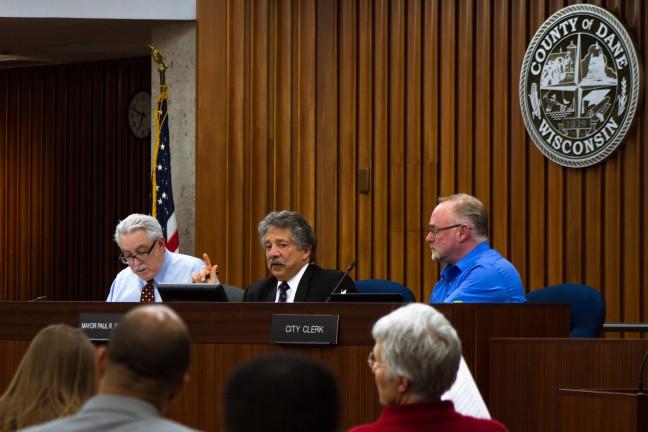After two days of deliberation, the Madison City Council on Tuesday approved a $369 million capital and $300 million operating budget for 2017, which includes funding for the public market, the Midtown Police Station and restorative justice programs.
After some tense disagreement over planning and construction, city council eventually voted 17-3 a budget amendment providing $13.1 million of funding for the creation of a public market in Madison in the city’s capital budget. The city would not provide funding until final design of the project is completed. Federal and private funds will also be used to finance the project.
The market, which city council has not yet approved, will be located along First Street near the intersection of East Washington Avenue and Johnson Street. The space will feature a mix of food retail, community uses, arts and crafting vending and events.
Ald. Sara Eskrich, District 13, who voted against the capital budget, proposed two other amendments that did not pass. Both would have reduced funding from the 2017 budget and from the 2017 Capital Improvement Plan.
No new projects: Soglin slashes budget requests for 2017 capital budget
Eskrich said she does not think it is responsible to follow through with the public market given the city’s financial constraints.
Ald. Denise DeMarb, District 16, said she hopes there will be more clarity and more accountability with the project.
“My hope is the public market is wildly successful,” DeMarb said.
Mayor Soglin still hesitant on contentious Midtown police station
The approved budget also contains $10.8 million in funding for the construction of the Midtown Police Station that is slated to begin in mid 2017.
The Madison Police Department has maintained that construction of the station is necessary to maintain consistent coverage around Madison. But Mayor Paul Soglin has opposed the project because of its hefty price tag and does not see the station as a necessity in this year’s budget.
During the public hearing portion of the capital budget, many community members, including some representing Freedom Inc., an advocacy group for people of color, voiced their disapproval of its possible construction.
Alix Shabazz, a community organizer for Freedom Inc., said she opposes Midtown, but is in support of the restorative justice program.
“What program do you know can fail the community they are supposed to serve and get more funding?” Shabazz said.
T. Banks, a community organizer, focused on the youth in Madison, many of whom feel uneasy around MPD. She said they want community control over the budget because the communities know what is best for them.
Soglin focuses on upward economic mobility in 2017 operating budget
Tuesday, the council approved $122,500 in funding in the city’s operating budget for the restorative justice program, which diverts youth out of the municipal court system.
Carousel Bayrd, the restorative justice policy and partnership coordinator for YWCA Madison, said the program has been very successful. She said the program will not remain as successful without the funding since the extra was a one-time fund.
Bayrd said the program has supported around 60 percent African-American youth and 8 percent Latino youth.
Voting in support of the program, Ald. Shiva Bidar-Sielaff, District 5, said it sends a positive message from MPD that they want to build trust and work on core issues within the community.
“This program will start changing the trajectory of our young people,” Bidar-Sielaff said.
Similarly, MPD Police Chief Mike Koval said the program gives young kids, particularly kids of color, the chance to create a different path for themselves.
Before approving funding for the 15-point plan — a three-year framework developed by community leaders to reduce violence in Madison — the council held a lengthy discussion on whether it would be effective in mitigating rising violence.
A major point of discussion was whether the plan was designed in a way that would truly reach the persons most in need.
“I’ve seen many programs and resources where it does not get down to the people most impacted and most affected,” Ald. Barbara Harrington-McKinney, District 1, said.
Echoing a similar sentiment, Ald. Sheri Carter, District 14, said she was not ready to use the $400,000 reserved for the 15-point plan at this time.
Even though she did not support the amendment, she said all of the alders must recognize that this is a city-wide issue.
“Not one of us can say my district, my constituents are concerned, all of our constituents are concerned,” Carter said. “My concern is the service not getting all the way down to the people who really need it most.”
But Ald. Matt Phair, District 20, who initially crafted the plan, said if the resources don’t get down to the people who need it most, then it will fail. These concerns of the plan possibly failing is what keeps driving him to ensure its success, Phair said.
Understanding there is a lot of pressure for the plan to work, Phair said it’s the city’s mandate to invest in people’s lives.
At a press conference Wednesday, Soglin said he plans to sign the budget.












